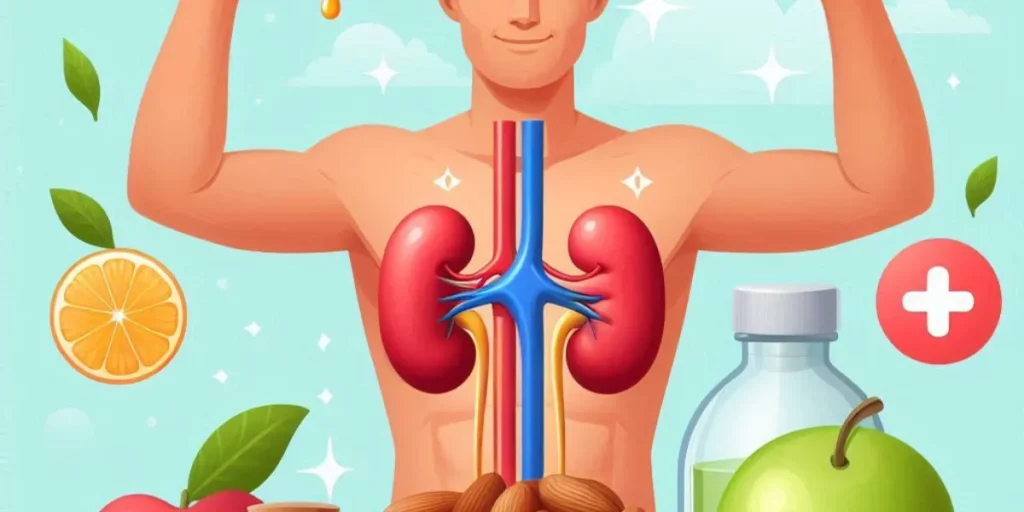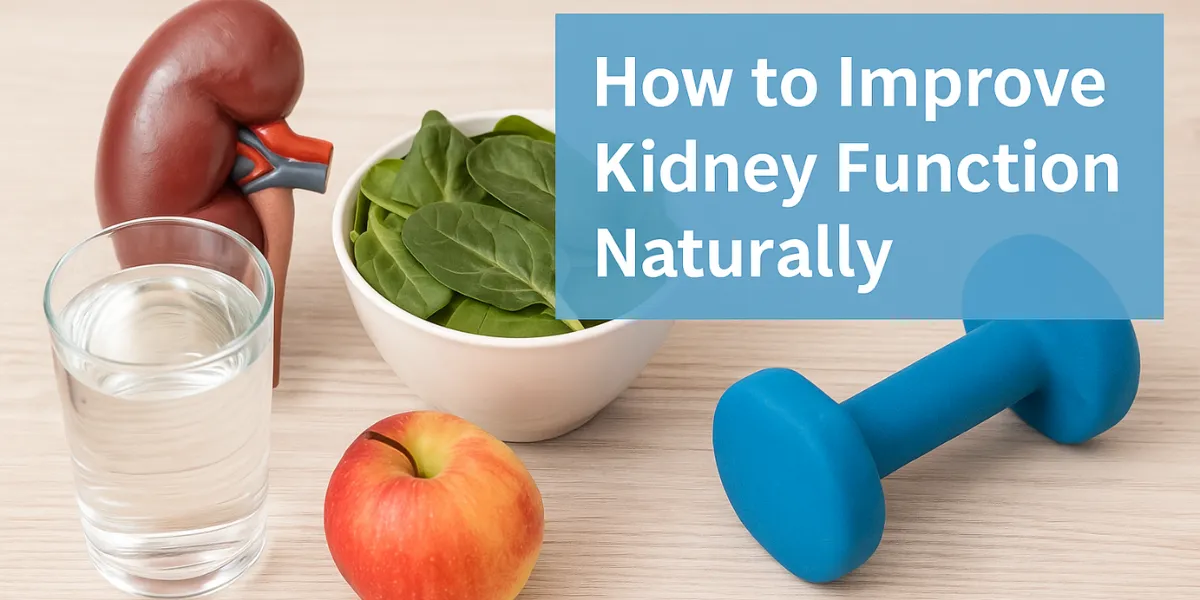How to Improve Kidney Function Naturally is something most of us don’t think about often — to be honest, we rarely pay much attention to our kidneys until something goes wrong. Yet these small, bean-shaped organs are quietly working overtime every single day. They filter roughly 50 gallons of blood and produce up to two quarts of urine daily. That’s no small feat. So it makes sense to show them some love before trouble starts.
Now, improving kidney function isn’t about quick hacks or gimmicks (I wish it were that simple). It’s more about steady, sensible shifts in how we treat our bodies. Over the years, I’ve noticed that even small lifestyle tweaks can make a real difference — not just in how our kidneys function, but in how we feel overall.
Table of Contents
Why Kidney Health Matters More Than You Think
Your kidneys don’t just filter waste. They balance electrolytes, regulate blood pressure, and even help control red blood cell production. When kidneys start declining — which, let’s be honest, happens subtly with age — you might not feel symptoms right away. That’s the sneaky part.
But here’s the thing: protecting kidney health is way easier than trying to reverse damage later. And frankly, prevention feels less stressful (and less expensive) than treatment.
1. Hydration — But Don’t Overdo It
We’ve all heard “drink more water” a thousand times. Still, when it comes to kidneys, hydration really does deserve the hype. Water helps kidneys clear sodium, urea, and toxins efficiently.
That said, more isn’t always better. It seems like chugging gallons daily won’t give your kidneys superpowers. In my experience, sticking to around 1.5–2 liters (about 6–8 cups) daily works for most people — unless you’re sweating buckets at the gym or live somewhere blisteringly hot.
Side note: If your urine is consistently pale yellow and you’re not feeling thirsty all the time, you’re probably in the hydration sweet spot.
2. Watch Your Salt — Gently
Here’s something I tell my clients all the time: you don’t need to ditch salt entirely. Your body actually needs sodium to function. The trick is keeping intake moderate — not minimal and not excessive.
High salt intake can make kidneys work harder by increasing blood pressure, which stresses the filtration process. The current general advice is to aim for less than 2,300 mg of sodium daily. Honestly, if you simply cut back on processed snacks, restaurant meals, and canned soups, you’re likely already cutting your salt load significantly.
3. Eat Kidney-Friendly Foods
Let’s talk food — because diet plays a starring role here. There’s no such thing as a single “kidney superfood” (despite what flashy headlines claim). But several foods seem to support overall kidney health nicely:
- Berries (like blueberries and cranberries): Packed with antioxidants.
- Leafy greens (in moderation): Good for vitamins and minerals, though watch potassium if you have kidney disease.
- Fatty fish (like salmon): Contains omega-3s, which help reduce inflammation.
- Red bell peppers: Low in potassium, high in vitamin C and fiber.
In my kitchen, I try to balance meals with these kinds of ingredients regularly — without getting overly rigid. Real life happens, after all.
4. Stay Active (Yes, Exercise Helps Your Kidneys Too)
It’s likely no surprise that regular exercise benefits kidney health indirectly. Moving your body improves blood circulation, reduces blood pressure, and helps control weight — all of which take strain off your kidneys.
You don’t have to run marathons. Walking 30 minutes a day, cycling, or even dancing around your living room (I’m guilty of this on weekends) goes a long way.

5. Monitor Medications and Supplements
Here’s something people forget — over-the-counter painkillers like ibuprofen, taken too frequently, can harm kidneys over time. So can megadoses of certain supplements (vitamin C and protein powders, I’m looking at you).
It’s arguably wise to check with your doctor before starting any long-term supplement routine, especially if you already have diabetes, hypertension, or any early-stage kidney issues. Better safe than sorry.
Can You Reverse Kidney Damage?
This is a question I hear a lot. To be upfront — if there’s already significant kidney damage, it’s tricky to fully reverse. But slowing progression? Absolutely possible. Many of the strategies I’ve shared here can help stabilize kidney function and prevent further decline.
Final Thoughts (Improve Kidney Function Naturally)
Kidney health, in my experience, is all about consistency, not perfection. You don’t need to overhaul your entire life overnight — small, sustainable habits stick better anyway.
I’ve noticed that once people feel better overall (more energy, clearer skin, better digestion), they’re naturally motivated to keep up with these kidney-friendly habits. And that’s what matters most.
Take it slow. Drink your water. Eat real food. Move often. Your kidneys — and the rest of your body — will thank you. Learn more about kidney health. Read our blogs here…Improve Health, Health Tips
Frequently Asked Questions
What are the first signs of kidney problems?
The first signs of kidney problems often include fatigue, swelling in the ankles or feet, changes in urine color or frequency, and unexplained nausea.
Can kidney function improve on its own?
Kidney function rarely improves on its own, but lifestyle changes like better hydration, diet, and blood pressure control can help slow damage and support function.
How much water should I drink to improve kidney health?
It’s recommended to drink about 1.5 to 2 liters (6–8 cups) of water daily to support healthy kidney function — unless advised otherwise by a doctor.
Which foods help repair kidneys?
Foods like berries, fatty fish, red bell peppers, and leafy greens may help support kidney health thanks to their antioxidants and anti-inflammatory properties.
What is the best exercise for kidney health?
Moderate aerobic activities like walking, cycling, and swimming improve circulation and reduce kidney strain, supporting better overall kidney health.
Can you reverse stage 1 kidney disease?
Stage 1 kidney disease is often manageable. With proper lifestyle adjustments and medical guidance, it’s possible to slow progression and protect kidney function.
Is coffee good or bad for kidneys?
Moderate coffee intake (1–2 cups a day) is generally safe for healthy kidneys and may even offer protective antioxidants. Excess caffeine, however, should be avoided.
How does high blood pressure affect kidneys?
High blood pressure damages blood vessels in the kidneys, reducing their ability to filter waste efficiently, which can lead to kidney disease over time.
What vitamins help kidney function?
B vitamins, vitamin D, and omega-3 fatty acids may support kidney health. Always consult a doctor before supplementing, especially with existing kidney conditions.
How quickly does kidney disease progress?
The progression of kidney disease varies widely. With early detection and healthy habits, it can progress very slowly — sometimes taking years.

